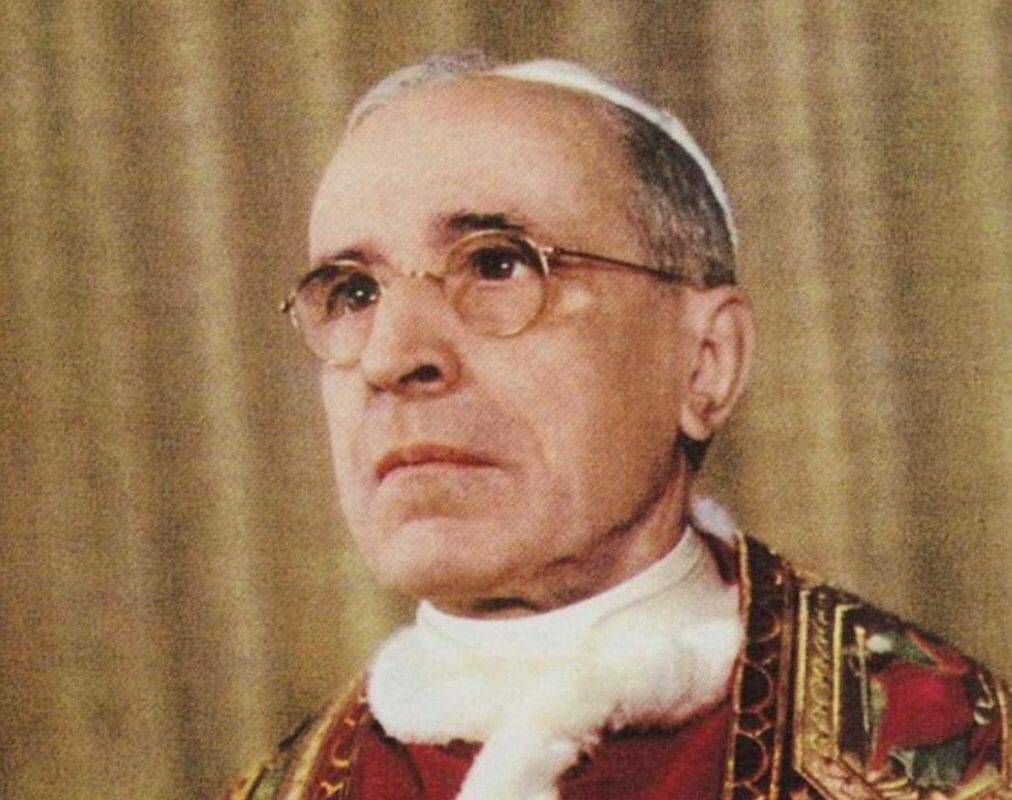
The controversial Pope Pius XII. WIKIPEDIA
This month in 1958, Pope Pius XII died in Castel Gandolfo, Italy. He was the immediate predecessor of John XXIII. On the 19th of December 2009, Benedict XVI proclaimed Pius XII “Venerable,” together with John Paul II, asserting that both pontiffs had lived heroic and virtuous lives. The title “Venerable,” when given, is one step before Beatification in the long and tedious canonization process.
In proclaiming Pius XII, who reigned from 1939 to 1958, as someone living a heroic life met with various reactions, mostly focused on the Holy Father’s decisions and actions during World War II. The Italian pope led the Catholic Church during this tumultuous period, but his silence on the fate of the millions of European Jews killed during the German Holocaust has clouded his legacy with controversy.
Authors like John Cornwell and Garry Wills became darlings of secular extremists when they published their written works lambasting Pius XII. Cornwell’s Hitler’s Pope (1999) and Garry Wills’ Papal Sin (2000) became New York Times bestsellers at the expense of the pope. Added to these is Daniel Goldhagen’ opus A Moral Reckoning: The Role of the Catholic Church in the Holocaust and Its Unfulfilled Duty of Repair (2002) that portrays Pius XII as a cog in a wider Roman Catholic anti-Semitic machinery.
Let it be said that the crime imputed upon the Italian pontiff was more of omission rather than commission.
Understandably, the Jewish community was surprised by the title “Venerable” given to the Italian pope, with Rabbi Marvin Hier saying that “there would be a great distortion of history” if Pius XII were canonized.
A canonized saint with a heavy-in-the-heart kind of baggage of historical controversies is not good news at all. Therefore, before going any further into the canonization process, Pope Francis has decided to open the Vatican Secret Archives for scholars who are doing in-depth studies regarding the Pontificate of Pius XII.
The Jesuit pontiff’s aim is simple, in his words, so that “serious and objective historical research will succeed in evaluating in its proper light, with appropriate criticism, the praiseworthy moments of that Pontiff, moments of grave difficulty, of anguished decisions, of human and Christian prudence.”
You see, Pope Francis is a veritable learner of the lessons of past events. He, as head of the Society of Jesus in Argentina (1973-1979), was also accused of the same silence in the midst of great sufferings of people. He was accused of being “complicitly silent” during the “dirty war of murders” carried out by Argentina’s brutal military dictatorship.
In particular, the journalist Horacio Verbitsky, the author of the book titled El Silencio, damningly claims that Bergoglio withdrew his order’s protection from two left-leaning Jesuit priests, effectively giving the military junta a green light for their abduction.
When to scholars he opened the Vatican Secret Archive, known for many centuries to hold old manuscripts and printed materials that were considered “forbidden,” Pope Francis made his point, that is, “The Church is not afraid of history but, rather, she loves it, and would like to love it more and better, as God loves it!”
In March 2020, Pope Francis changed the name of the Vatican Secret Archive to the Vatican Apostolic Archive, so that more and more scholars can avail of the richness of history once forbidden for public use.
A few years ago, I did an in-depth study on the ad intra institutional self-reflection and reform of the Church and her ad extra dialogue with the world, a study that included the controversies surrounding the pontificate of Pius XII. My thesis was this, that the first one [ad intra reform] is required before doing the second [ad extra dialogue].
After putting everything into a common language and down-to-earth prose and when I was groping for the most appropriate title for the final manuscript, one good friend and theologian suggested this: “The Church can handle the truth.” He told me that the Church’s ad intra renewal efforts cannot even start without an honest admission of the truth, which St. John XXIII, St. Paul VI, St. John Paul II, Pope Emeritus Benedict XVI, and Pope Francis did during their pontificates. They admitted the truth and faced the world, armed with an honest desire to reform the Church.
A determined student of history, I was forewarned by some good friends in the Church hierarchy, always with the best of intentions, that “when you dig, you get dirty. When you dig deeper, you get dirtier.”
Respectfully, I replied: Noted. To the title The Church can handle the truth, I added a subtitle: Mercy-healing of historical wounds.
I know that the stories I narrated in that book were grounded on “serious and objective historical research.” I also hope that those who read my own interpretation of the past events may be led to the “purification of memory,” a doable formula I borrowed from John Paul II. The Polish saint and pope once believed that in learning the lessons of the past we can liberate both our personal and communal conscience from all forms of resentment and heavy-in-the-heart kind of baggage of history.
Whatever is the judgement of history on Pope Pius XII, I still hold the solemn assurance that the ship on its mighty voyage in the open seas – the Barque of Peter battered by some ferocious waves and winds – remains definitely Christ’s visible and historical presence on earth, the one, holy, Catholic, and Apostolic Church!
José Mario Bautista Maximiano is the author of ‘MCMLXXII: 500-Taong Kristiyano (Claretian, 2021), Volume Two,’ declared the “Best Book in Ministry” by the 16th Cardinal Sin Catholic Book Awards this year.

